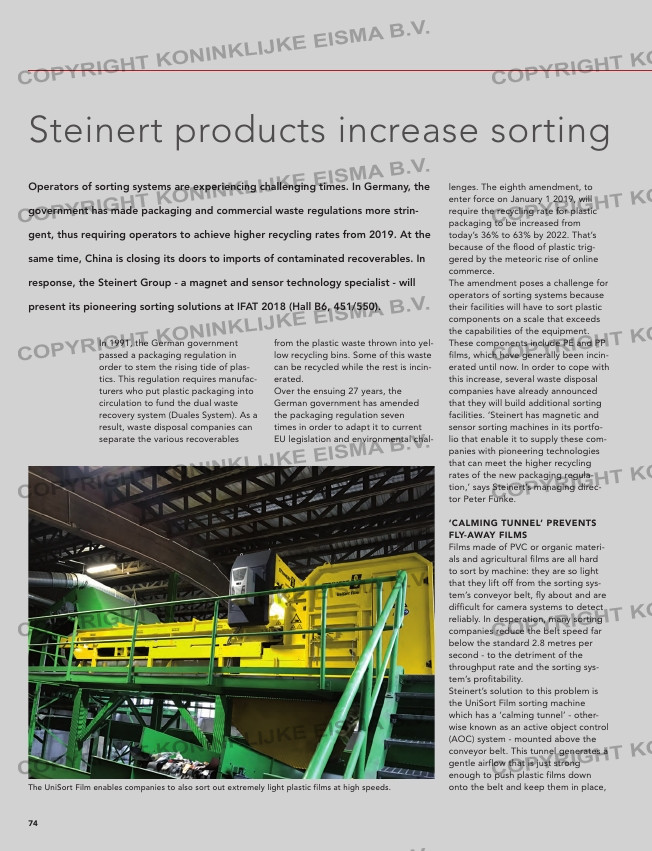Steinert products increase sorting depth and material purity
Operators of sorting systems are experiencing challenging times. In Germany, the
government has made packaging and commercial waste regulations more strin-
gent, thus requiring operators to achieve higher recycling rates from 2019. At the
same time, China is closing its doors to imports of contaminated recoverables. In
response, the Steinert Group – a magnet and sensor technology specialist – will
present its pioneering sorting solutions at IFAT 2018 (Hall B6, 451/550).
In 1991, the German government
passed a packaging regulation in
order to stem the rising tide of plas-
tics. This regulation requires manufac-
turers who put plastic packaging into
circulation to fund the dual waste
recovery system (Duales System). As a
result, waste disposal companies can
separate the various recoverables
lenges. The eighth amendment, to
enter force on January 1 2019, will
require the recycling rate for plastic
packaging to be increased from
today’s 36% to 63% by 2022. That’s
because of the flood of plastic trig-
gered by the meteoric rise of online
commerce.
The amendment poses a challenge for
operators of sorting systems because
their facilities will have to sort plastic
components on a scale that exceeds
the capabilities of the equipment.
These components include PE and PP
films, which have generally been incin-
erated until now. In order to cope with
this increase, several waste disposal
companies have already announced
that they will build additional sorting
facilities. ‘Steinert has magnetic and
sensor sorting machines in its portfo-
lio that enable it to supply these com-
panies with pioneering technologies
that can meet the higher recycling
rates of the new packaging regula-
tion,’ says Steinert’s managing direc-
tor Peter Funke.
‘Calming tunnel’ prevents
fly-away films
Films made of PVC or organic materi-
als and agricultural films are all hard
to sort by machine: they are so light
that they lift off from the sorting sys-
tem’s conveyor belt, fly about and are
difficult for camera systems to detect
reliably. In desperation, many sorting
companies reduce the belt speed far
below the standard 2.8 metres per
second – to the detriment of the
throughput rate and the sorting sys-
tem’s profitability.
Steinert’s solution to this problem is
the UniSort Film sorting machine
which has a ‘calming tunnel’ – other-
wise known as an active object control
(AOC) system – mounted above the
conveyor belt. This tunnel generates a
gentle airflow that is just strong
enough to push plastic films down
onto the belt and keep them in place,
from the plastic waste thrown into yel-
low recycling bins. Some of this waste
can be recycled while the rest is incin-
erated.
Over the ensuing 27 years, the
German government has amended
the packaging regulation seven
times in order to adapt it to current
EU legislation and environmental chal-
The UniSort Film enables companies to also sort out extremely light plastic films at high speeds.
74
74-75_steinert-spread.indd 74 25-04-18 09:10




